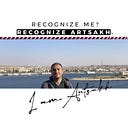Mohsen Al-Balasy The Multi-talented Surrealist
Mohsen Al-Balasy is an Egyptian writer, poet, journalist, and artist, who is the editor-in-chief of El-Ghorfa magazine, The International Surrealists Magazine.
He has worked in the field of journalism, has published numerous articles and poetic texts in several Egyptian and international newspapers, magazines, websites including The Omani newspaper Al-Ro’yaa and Hikma magazine.
Al-Balasy held several art exhibitions in partnership with the artist Magda Khoja such as the exhibition “Freedom or Death” at the Prince Taz Palace in Cairo with the support of three Egyptian ministries, the Ministry of Tourism, the Ministry of Antiquities, and the Ministry of Culture. Then the exhibition “Psalms of Aero Political” “مزامير إيرو سياسية” at The Cairo Atelier.
He also held several poetry evenings, including a poetry evening held in 2016 at the Princess Angie Museum at Prince Taz Palace in Cairo, brought him together with the poet Youssef Musallam and participated in a cultural evening entitled “Surrealism is a global citizenship” organized by the Ministry of French culture in 2021 as part of the annual “Reading Nights” festival in partnership with the house of André Breton in St. Cirque la Bobby, France, and the collection “Impossible Rose” “الوردة المستحيلة” headed by the French poet, critic and publisher Laurent Dussier, director of the House of André Breton.
Additionally, he translated poems from surreal poetry by several international poets. In his book “The Rejection of the Poem”, published in 2019, Mohsen Al-Balasi delves into the world of the Egyptian surrealist poet “Albert Kassiri” and translates three poems for him, the last of his lost diwan.
In his book “The Journey of the Surrealist Kamel Al-Telmisany in the Face of Realism”, published in 2020. Al-Balasy talks about the life of the Egyptian artist and film director Kamel Al-Telmisany, about the history of the surreal movement in fine art in Egypt in the 1940s in general, then about his departure from fine art and its transformation into the current real-life cinema, as he saw that surreal artist became isolated from the worries of the working classes, even if they claimed otherwise.
Surrealism existed only in bourgeois circles. The book then deals with Al-Telmisany’s work as an artistic consultant for Lebanese singer Fairuz and Al-Rahbani brothers. The author recounts facts and events in a lively narrative without boredom, and the book is interspersed with surreal poetic texts belonging to the type of poetry of activation or the so-called prose poem. The writer May Al-Telmisany, niece of the late artist Al-Telmisany, praised the book.
